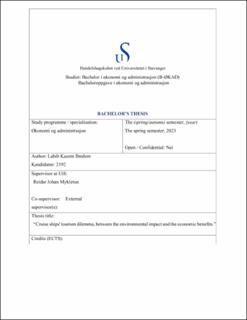| dc.description.abstract | Abstract
This bachelor thesis investigates how Stavanger city, Norway, can balance the economic benefits and environmental costs of cruise ship tourism, which is a vital but controversial industry for the city. To answer this question, I conducted interviews with local businesses that are affected by cruise tourism, reviewed recent studies on the environmental impacts of this industry on the city's air quality and marine life, and applied stakeholder and sustainability management theories to analyse the findings. The results shows that cruise tourism generates significant income and employment opportunities for some businesses in Stavanger, but also creates conflicts with other stakeholders such as residents, and public authorities. Moreover, cruise tourism poses relative threats to the city's natural environment, especially in terms of greenhouse gas emissions which was found to not be significant, noise pollution, and visual pollution representing the main pollution subject to the city. Based on these results, I suggest some potential solutions or recommendations that could help the city achieve a more sustainable and balanced development of cruise tourism. While sustainability is often understood as a social objective that aims to ensure the long-term coexistence of humans on Earth. However, and since this term has not been easy to be define precisely, as it has changed and diversified across different texts, contexts, and times. A common way to conceptualize sustainability is to consider its three dimensions: environmental, economic, and social, also known as the three p’s model. As the environmental dimension is emphasized as the most crucial for addressing the environmental challenges, while there is a distinguish between sustainability and sustainable development, regarding the latter as a pathway to achieve the former (Sustainability., n.d.). This thesis posits that sustainable development can be achieved by utilizing profits as a cornerstone for the betterment of both society and the environment. By including and implementing stricter regulations and standards for cruise ships, which can eventually make this industry more sustainable by promoting investment in green energy. Furthermore, promoting the media to deliver the whole picture presented by stakeholders, and enhancing stakeholder engagement and collaboration. I chose Stavanger as the case study for my research because it is the home of my own experiences in the industry as well as a city that has seen significant growth in cruise tourism in recent years. I hope that this study can contribute to the ongoing debate and policymaking regarding cruise tourism in Stavanger and other similar destinations. | |
